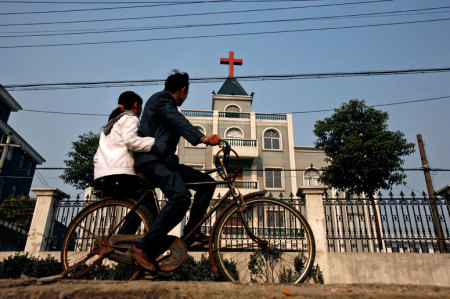Al Mohler Warns Protestants Will Also Suffer Under China's Vatican Deal

Albert Mohler Jr., president of The Southern Baptist Theological Seminary in Louisville, Kentucky, has warned that a deal between the Vatican and China over bishop appointments will negatively impact Protestants and Catholics alike.
The Vatican announced on Saturday that a provisional agreement was reached with the Chinese government in Beijing to end decades of conflict over who should appoint Catholic bishops in the Communist nation.
While certain details of the deal remain unknown, reports of the agreement indicate that Chinese officials will submit a candidate for bishop to the Vatican and the pope will have final say over the matter.
In an episode of Mohler's podcast "The Briefing" that aired Wednesday, the Southern Baptist leader said that he believed the agreement was "of evil consequence, not only for Catholics in China but also for Protestants."
"A professor of divinity at the University of Hong Kong pointed to the fact that the Chinese Communist Party is simply trying to become the totality of the society. By the way, let's just remind ourselves, that's what makes a totalitarian government totalitarian," said Mohler.
"And this professor, pointing to the implications for Protestant churches, including the even more numerous underground Protestant churches, he said, 'The message is that they can't be independent. The question is control.'"
Mohler also said that the agreement was part of the Communist Chinese government's ongoing efforts to control the spread of Christianity in the Asian nation.
"It wants to hold Christianity in the vice grip of its own political and social power. The simplest barest fact is that Beijing, the Chinese Communist Party, would not have entered into this agreement unless it saw the agreement as in its own interests, profoundly unquestionably in its own interest," added Mohler.
Mohler is not the only critic of the Vatican-Beijing deal. Christian Solidarity Worldwide, a United Nations-accredited persecution watchdog NGO, has also expressed concerns about it.
"CSW is deeply concerned about the timing of this provisional agreement between the Chinese government and the Vatican," said CSW's East Asia Team Leader Benedict Rogers in a statement.
"While we understand some of the motivations behind the Vatican's effort toward an agreement, there are significant concerns about the implications for freedom of religion or belief in China."
Rogers asserted that if the agreement is to have "real value," the agreement itself must have freedom of religion or belief as one of its central components.
"We reiterate our call on the Chinese authorities to release all Catholics in China held in any form of detention, and all others detained in connection with their peaceful religious activities," said Rogers.
In recent years, China has appeared to be stepping up the persecution of its Christian minority, overseeing among other things numerous church demolitions, arrests of those involved in house churches, and the removals of crosses from sanctuaries.





















